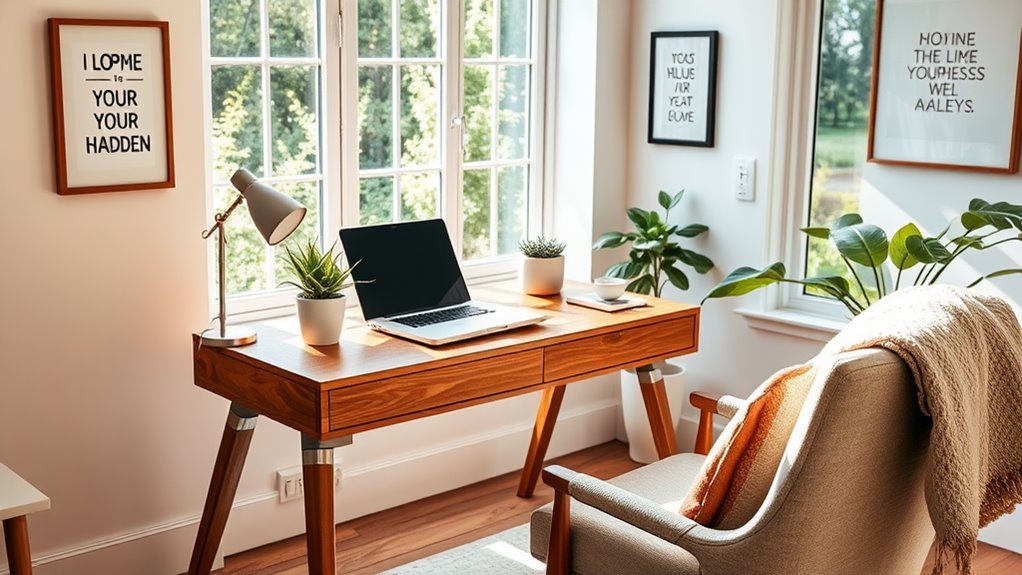Work-from-Home Tips That Keep You From Burning Out
To prevent burnout while working from home, establish clear boundaries by setting specific work hours and communicating them to others. Designate a dedicated workspace that minimizes distractions and is ergonomically friendly. Schedule regular breaks to refresh your mind and avoid long stretches of screen time. Prioritize healthy habits by staying active, eating well, and getting enough sleep. Finally, stay connected with coworkers and loved ones through regular check-ins to foster support and camaraderie. By following these tips, you can create a healthier work environment and maintain your well-being, revealing even more strategies as you continue exploring!
Key Takeaways
- Establish clear boundaries by setting specific work hours and avoiding multitasking to enhance efficiency and reduce stress.
- Designate a quiet, organized workspace to minimize distractions and signal your brain that it’s time to focus.
- Schedule regular breaks to recharge your mind and body, preventing burnout from prolonged screen time.
- Prioritize healthy habits such as exercise, nutritious eating, and proper hydration to maintain energy levels throughout the day.
- Stay connected with colleagues and loved ones through regular check-ins and virtual interactions to foster support and prevent isolation.
Establish Clear Boundaries
When you work from home, it’s crucial to establish clear boundaries to maintain productivity and personal well-being.
Start by setting specific work hours and stick to them. Communicate these hours to your family and friends, so they respect your time.
Avoid multitasking during work hours; focus solely on your tasks to increase efficiency.
It’s also important to take regular breaks to recharge. Use these breaks to step away from screens, stretch, or grab a snack.
If possible, limit distractions like social media and personal calls during work hours.
Finally, signal the end of your workday with a routine, like shutting down your computer or changing into casual clothes.
These steps will help you maintain a healthy work-life balance.
Designate a Workspace
Creating a dedicated workspace can greatly enhance your productivity while working from home. When you establish a specific area for work, it signals your brain that it’s time to focus.
Here are some tips to help you create an effective workspace:
-
Choose a Quiet Spot: Find a location away from distractions, like TV or noisy family members.
-
Invest in Ergonomics: Use a comfortable chair and desk to maintain good posture and avoid fatigue.
-
Personalize Your Space: Add elements that inspire you, such as plants or artwork, to keep your spirits high.
-
Limit Clutter: Keep your workspace organized to minimize stress and improve concentration.
Schedule Regular Breaks
To maintain your focus and productivity while working from home, scheduling regular breaks is essential. These short pauses help refresh your mind and boost your energy levels, preventing burnout.
Here’s a simple way to structure your breaks:
| Break Type | Duration | Frequency |
|---|---|---|
| Quick Stretch | 5 mins | Every hour |
| Coffee Break | 10 mins | Every two hours |
| Lunch Break | 30 mins | Midday |
Implementing this schedule allows you to recharge and return to your tasks with renewed concentration. You’ll find that taking time away from your screen can greatly improve your overall performance and well-being. So, don’t skip those breaks – they’re key to staying productive at home!
Prioritize Healthy Habits
While working from home offers flexibility, it’s essential that you prioritize healthy habits to maintain your physical and mental well-being.
Here are four key habits to incorporate into your daily routine:
-
Stay Active: Set aside time for exercise, whether it’s a quick home workout or a walk outside.
-
Eat Well: Keep nutritious snacks and meals on hand to fuel your body and mind.
-
Hydrate: Drink plenty of water throughout the day to stay alert and focused.
-
Get Enough Sleep: Aim for 7-9 hours of quality sleep each night to recharge your energy.
Stay Connected With Others
How can you maintain a sense of connection when working from home? Start by scheduling regular check-ins with your colleagues. Video calls can help bridge the gap and make conversations feel more personal.
Don’t underestimate the power of informal chats; consider setting up virtual coffee breaks to catch up on non-work topics.
Join online groups or forums related to your industry to interact with others and share insights. Additionally, keep communication channels open through messaging apps. A quick message can brighten someone’s day and foster camaraderie.
Lastly, don’t forget about connections outside of work. Reaching out to friends or family during breaks can provide a much-needed emotional boost and remind you that you’re not alone in this journey.
Frequently Asked Questions
How Can I Avoid Distractions While Working From Home?
To avoid distractions while working from home, set clear boundaries, create a dedicated workspace, and turn off notifications. Prioritize tasks, use time blocks, and take regular breaks to maintain focus and boost productivity.
What Tools Can Help Manage My Work-From-Home Schedule?
To manage your work-from-home schedule effectively, use tools like Google Calendar for planning, Trello for task organization, and Focus@Will for concentration. These will help you stay on track and enhance your productivity throughout the day.
How Do I Deal With Family Interruptions During Work Hours?
To deal with family interruptions during work hours, set clear boundaries. Communicate your schedule, use visual cues like a closed door, and establish specific times for family interactions. Consistent reminders help everyone respect your work time.
What Are Some Signs of Burnout to Watch For?
You might notice increased fatigue, decreased motivation, irritability, or difficulty concentrating. If you’re feeling overwhelmed or disengaged, it’s essential to recognize these signs early and take steps to address them before they worsen.
How Can I Stay Motivated on Low-Energy Days?
On low-energy days, break your tasks into small chunks, set clear goals, and reward yourself for completing each one. Don’t forget to take short breaks; they’ll help recharge your motivation and energy levels.





